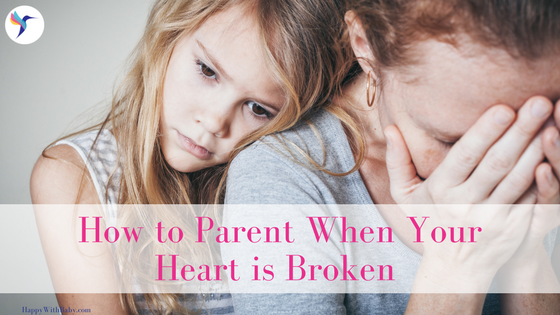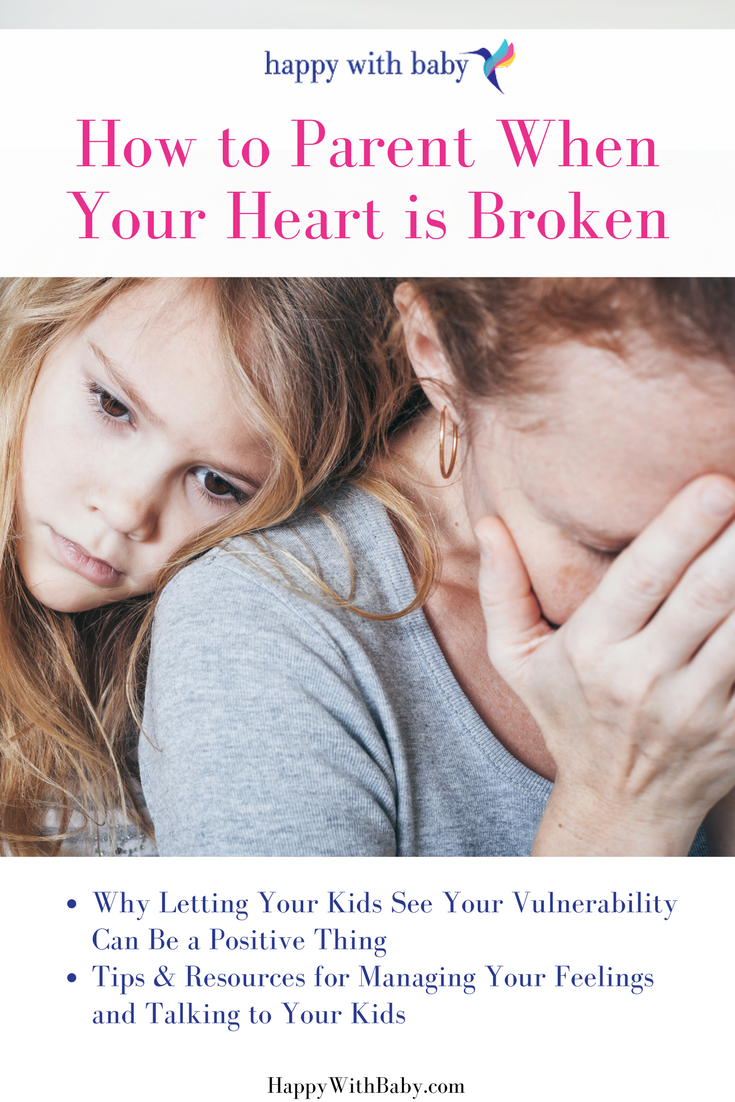How to Parent When Your Heart is Broken

Parenthood is never easy, even when life seems perfect. And those times when life is not so perfect? Harder. And those times when loss, tragedy, or trauma happen? The hardest.
Lately, it’s hard to listen to the news and log onto social media. It seems like there’s a new natural disaster or political mess every single day. It’s starting to feel normal, even though we know nothing about any of this is or should be normal.
With details about the Las Vegas Shooting coming out nearly a week later (and will probably continue to roll out in the weeks and months to come), we might be in for a rough emotional ride. Especially because of how particularly senseless or inexplicable this event feels. Especially if you know someone was there or otherwise feel some connection to that particular place.
But grief and trauma are funny things--they don’t always pop up when we expect them to and sometimes they seemingly come out of nowhere.
And that can be really hard for parents because our roles as parents don’t ever stop. We can’t always press pause on life so we can hide in the bathroom to have a good cry before moving on with our day. And we can’t always maintain appearances that we have it all together all the time or that we have a good answer for everything.
Sometimes, our kids will see us cry or yell or react.
Those moments we all have (and sometimes need to have!) that we wished no one ever had to witness… sometimes our kids will see us in those moments. It’s inevitable (I mean, come on, if you have small children at your house, how often do you even get to pee in peace?)
I want you to know that this is OK.
Whenever something tragic happens (and it does seem like mass shootings in particular have a way of really setting off our emotions as parents), it’s so common for parents to question: “How am I supposed to deal with this? How do I talk to my kids about what happened? I don’t want them to see me upset.”
These are valid questions that EVERY parent asks themselves, if not a therapist like me.
To be sure, it doesn’t even take a mass shooting to call us to question these things. Loss doesn’t always make headlines.
I remember back when a dear friend of mine passed away, and my daughter saw me crying. Having to explain to her why grownups cry, what death is, and what loss feels like was extremely challenging for me.
Not only that, but just allowing myself to be that vulnerable in her presence was uncharted territory. Would it scare her to see me so upset? Will she still see me as her rock if I’m crumbling myself?
The truth is, something almost magical can happen when we allow our kids to really see us feeling vulnerable or not having all the answers.

They learn empathy. They learn emotional intelligence. They learn it’s OK for everyone to have feelings. And we bond even deeper.
(Now, if my daughter sees me upset, she still asks me, “Momma, are you missing your friend again?” even if I’m just shaking off a stressful day with a good cry. It’s the sweetest.)
So, please understand that having big emotions about what’s going on in the world is OK and completely natural. The key is in how you manage them.
Here are ways you can get through it:
First and foremost, remember that grief and sadness looks different for everyone.
You might need a good long cry (or several). You might feel angry. Or, you might feel numb. There is a plethora of emotions that can come up when you’re feeling loss or experiencing trauma. Don’t judge it.
Self-care, self-care, self-care.
This doesn’t always mean pedicures and long walks on the beach. Sometimes the best self-care is simply taking things off your plate. What can you scratch off your to-do list, not because you completed it, but because it really isn’t something you need to expend energy on right now?
Do you need to exercise or take a nap?
Listen to your body. Sometimes movement helps us to clear our heads. Sometimes we can’t think straight until we get some sleep. Sometimes there’s comfort in a cup of tea or a long bath or a hot meal. Pay attention to what you physically feel and what you know works for you.
Limit your news intake.
Our minds and bodies can only take so much stress in one day. Pace yourself. The news will still be there for you tomorrow….or next week.
Find productive ways to channel your feelings.
If you find yourself getting pulled down the social media rabbit hole, log off and walk away! It might feel good to post how you’re feeling about an issue, but if you receive pushback that doesn’t lead to a productive conversation, it will not only waste your time, it will drain your energy. Do something productive that will contribute to healing or positive change, like volunteering, researching ways to help, reaching out to your community, donating to charity, or signing a petition.
Try meditation or focusing on slow, deep breaths.
You don’t need to be a master at this to feel the immediate positive effects of clearing your mind and focusing on your breath. If you can make this a daily habit, then even better. I promise your life will never get worse because you decided to slow down for 5-15 minutes a day.
Call a friend or decompress with your partner.
Talk it out, get a hug, feel the support around you before you offer support to others--including your kids.
Find ways to practice faith or to remind you of the good in humanity.
If you are a religious person, you might find comfort there. But whether you are or you aren’t, you can always seek out the good in the world. You might enjoy reading Good News Network online to know more about the good things that have happened each day that don’t always make national news. And, yes, cute puppy videos on YouTube count too.
Acknowledge what happened and how you feel about it honestly with your kids, especially with older ones.
It’s OK to not have all the answers. You’re allowed to admit confusion, fear, or uncertainty. And do describe to them how it makes you feel. Just be careful to not make broad categorical statements about people involved--like, “he’s clearly mentally ill” or commenting on a person’s race--as this can lead to prejudice. It’s OK to cry or be emotional in front of your kids, but don’t cry on their shoulder, which might cause stress they’re unprepared to handle, or act out physically (like throwing or hitting things), which might scare your kids. And if your kids are age 2 or younger, they might not understand what’s going on, but they will understand that you’re upset. So, try to keep calm and offer lots of cuddles.
Teach your kids what you want them to know.
The truth is, there’s just so much that is beyond our control. We can’t follow our kids everywhere or protect them from every injury or heartache. But, we can teach them what we want them to know about how to keep themselves safe, who they can trust, and how they can seek answers or support. When they’re really young, this starts with things like body autonomy, what to do when they get lost, and what we want them to know about diversity.
Seize the opportunity to press pause.
Practice gratitude, and hug your kids. The dishes can wait.
If your big emotions are stopping you from doing things you’d normally do, please do get help. You can reach out to me and I can help you find the resources you need.
Subscribe
Sign up to get the latest weekly blogs sent straight to your inbox


0 comments
Leave a comment
Please log in or register to post a comment